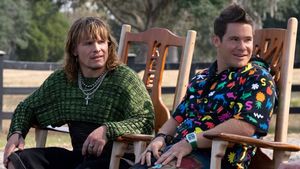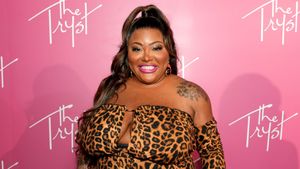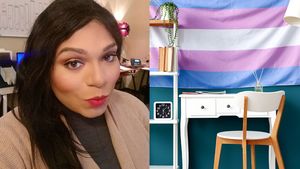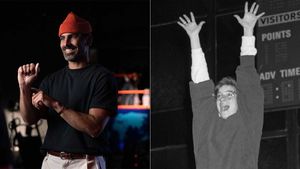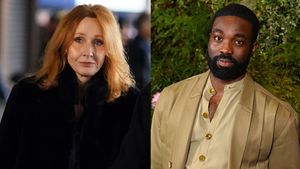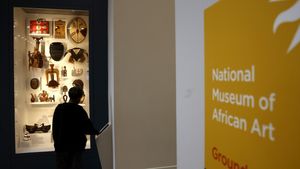The off-Broadway play, Afterglow, has a nearly impossible task to achieve: depict the complexity, highs and lows, and uncertainty that comes with open relationships—all within 85-minutes.
To its credit, it did the best one could do, but you couldn’t help but leave the intimate theater wanting more.
There’s been an upswing in talks about polyamory and open-relationships in the past few years. Gay men have very strong opinions on the topic, with some embarking on a “live and let live” attitude, and other (roughly a third of gay men) believing that “open relationships are not real relationships.”
Time and time again, I’ve heard men say that they feel that the relative universality of open relationships impinge on their ability to have a monogamous one. That’s why they get so angered by folks on Grindr who are looking for a third person to join their happy couple. While I don’t agree with the sentiment, I understand it: “I can’t even find one guy, and now you want two?”
That’s why the play Afterglow is necessary in the modern era. While a somewhat predictable depiction of open-relationships, it’s nevertheless an honest and vulnerable one.
The premise of the play is simple. Two gay married men, Josh and Alex (portrayed by actors Brandon Haagenson and Joe Chisholm respectively) have an open relationship. They invite a younger, third man, Darius, (Patrick Reilly) into their sex life. Josh becomes more involved with the Darius, eventually falling in love with him. Instead of embracing his emotions, Josh hides them from his husband Alex, fearing that Alex will force him to terminate their extra-marital relationship. Josh’s lies end up being exposed, and both Alex, Josh, and Darius get hurt. Without spoiling the play too much, Afterglow ends on a cliffhanger.

Afterglow truly excelled at dispelling negative stereotypes that surround open relationships. People don’t (always) use non-monogamous relationships as an excuse to sleep around. You’re not simply “using” the third person for sex.
I also think it accurately depicted how open relationships can get messy, especially when there’s the idea that you’re not allowed to like/date someone outside the couple. We don’t control who we fall for. We simply do. Sleeping with other people can sometimes enhance our feelings for others (even if we claim it’s just sex). Then we're left in this predicament. We never meant to like him. It was supposed to be just sex. But now we do like him. So what do we do?
But I think it dropped the ball in being a somewhat basic depiction of open relationships. It’s how I imagine folks who have never been in a polyamorous or open relationship image they all play out. Two people invite in a third. A member of the couple starts having feelings for the third. He lies. Everyone is hurt. The end.

This was the fear my mother had when I told her I started dating a married man. This was the fear my friends had. This was literally the fear everyone had who hadn’t ever been in a non-monogamous relationship.
I lived with my boyfriend and his wife. I have been the so called “third” in a non-monogamous relationship. So my approach comes from my experience, (which I’m aware isn’t the experience of others in non-monogamous relationships). But I would have loved to see something that went beyond the usual expectations of open relationships. I’m aware this would have been difficult to pull off in a play format, because there needs to be drama. There needs to be conflict. But in my relationship, (as is done in all healthy non-monogamous relationships) we tried (and excelled) in being as direct and honest as possible to avoid conflict. There would have been no play if Josh was honest to his husband. It would have been a conflict-free 25 minute snooze-fest.
However, I think there’s still a way to depict a polyamorous relationship with drama. My relationship still had drama. We still had issues, but not because we were lying to each other. Not because we were hiding our emotions. There’s a reason I’m no longer dating my previous boyfriend. (We still are, though, best friends.) We took some issues with one another’s other partners. They, of course, took issue with us. There were issues of time management. Issues regarding sex.

I guess all I’m trying to say here is that there were plenty of more complex issues that I think could have been depicted in a more nuanced and realistic way. I know I’m projecting. I know I’m critiquing this play from my own experience. Many gay men have experienced the exact same events that occurred in Afterglow. Surely, they would say this is the most realistic depiction of open-relationships they’ve ever seen.
So perhaps this is a call for more visibility. For more diversity. Afterglow is a great start, but in order for the conversation on open relationships to continue, we need to see more varied depictions of open and polyamorous relationships.
Afterglow has been extended, and is playing at The Loft at the Davenport Theatre in NYC until November 18th! You can purchase tickets right here!

































































